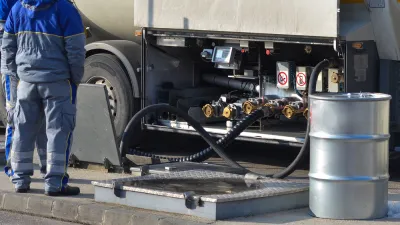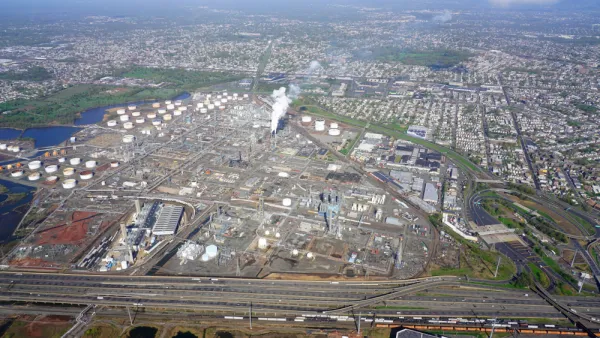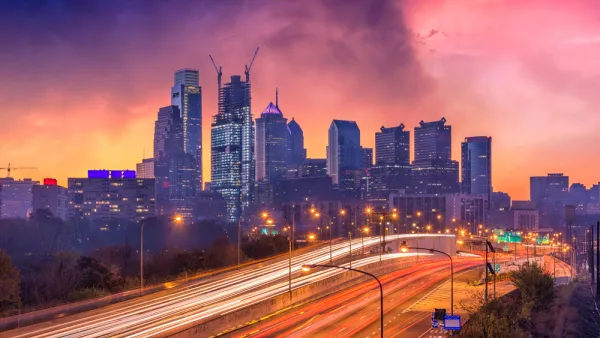Modeled on the nation's first mandatory cap-and-trade program that only targets power plant emissions, the Transportation & Climate Initiative subjects transportation fuel to a similar market-based program. It took a major step forward on Oct. 1.

Since 2017, the largest source of greenhouse gas emissions in the United States has been from the transportation sector, mostly from passenger vehicles, yet it seems that the power generation sector continues to grab the lion's share of attention when it comes to mitigating emissions. Policymakers in the Transportation and Climate Initiative (TCI), which will use a cap-and-invest as well as trade program, have taken a page from the power sector by adopting a program used by the Regional Greenhouse Gas Initiative.
"A coalition of New England and mid-Atlantic states on Tuesday took a first step toward limiting transportation emissions across 12 states and the District of Columbia," reports Rebecca Beitsch for The Hill.
At the heart of the draft proposal an effort that would place pollution limits on middlemen who bring gasoline to U.S. consumers, forcing those companies to buy credits to compensate for pollution that will stem from their products...[I]nstead of power plants their efforts will be focused on oil terminals that store fuel before it heads to market as well distributors of gasoline.
Leaders involved in the effort are unsure whether their proposal would raise prices at the pump.
The 12 states are Connecticut, Delaware, Maine, Maryland, Massachusetts, New Hampshire, New Jersey, New York, Pennsylvania, Rhode Island, Vermont, and Virginia, in addition to the District of Columbia. The last member to join the initiative was Virginia in September 2018.

Credit to Our Transportation Future and Natural Resources Defense Council
Affected Fuels and Emissions
"The proposed program would cap emissions of carbon dioxide from the combustion of the fossil component of finished motor gasoline and on-road diesel fuel in the region," states the four-page "Framework for a Draft Regional Policy Proposal" [pdf].
The TCI jurisdictions are evaluating whether and how to include and treat biofuels in the program. Affected fuel would include fuel destined for final sale or consumption in a TCI jurisdiction, upon removal from a storage facility...
TCI supporters
A sampling of reactions to the draft framework was released Tuesday by Our Transportation Future, a coalition of 64 leading environmental, scientific, transportation, health, and business organizations across the Northeast and Mid-Atlantic region advocating in support of TCI.
“Taking on the largest source of air pollution will require bold solutions, and the TCI framework released today offers a solid foundation for a bold, regional cap-and-invest program,” said Jordan Stutt, Carbon Programs Director at Acadia Center. “The TCI states need to build on that foundation by establishing an ambitious cap on emissions..."
“We are heartened by the broad TCI framework released today," said Nancy Goodman, vice president for policy, Environmental League of Massachusetts. "This effort to price carbon within a region has great promise for addressing emissions from transportation..."
David Abel of The Boston Globe also reports (behind paywall) on the draft framework. His article also was posted (without a paywall) by Our Transportation Future:
“This entire project aims to reduce emissions, improve public transportation, equity, mobility, and engagement,” said Kathleen Theoharides, secretary of the Massachusetts Executive Office of Energy and Environmental Affairs, who has chaired the effort known as the Transportation Climate Initiative.
Theoharides said the states are still negotiating over whether to place requirements on how the proceeds from the pollution permits, also known as allowances, could be used. The goal is to invest the money in a range of transportation-related projects, such as public transit, carpooling, and subsidies to accelerate the adoption of electric vehicles, she said.
"A final agreement isn’t expected until spring 2020," adds Beitsch for The Hill. Pete Rafle, communications director for the Georgetown Climate Center which facilitates TCI's efforts, clarified in an email that all 13 members will determine whether to sign the memorandum of understanding at that time, regardless of whether they signed the December 2018 Initiative Statement [pdf], the subject of our first post on the initiative that was launched in 2010.
More information on what TCI calls its "regional policy proposal design process" can be found in this 2-page fact sheet [pdf].
Related in Planetizen:
-
An East Coast Cap-and-Invest Approach to Reducing Transportation Emissions, December 20, 2018
Hat tip: InsideClimate News.
FULL STORY: Northeast states takes first step in effort to reduce transportation emissions

Analysis: Cybertruck Fatality Rate Far Exceeds That of Ford Pinto
The Tesla Cybertruck was recalled seven times last year.

National Parks Layoffs Will Cause Communities to Lose Billions
Thousands of essential park workers were laid off this week, just before the busy spring break season.

Retro-silient?: America’s First “Eco-burb,” The Woodlands Turns 50
A master-planned community north of Houston offers lessons on green infrastructure and resilient design, but falls short of its founder’s lofty affordability and walkability goals.

Test News Post 1
This is a summary

Analysis: Cybertruck Fatality Rate Far Exceeds That of Ford Pinto
The Tesla Cybertruck was recalled seven times last year.

Test News Headline 46
Test for the image on the front page.
Urban Design for Planners 1: Software Tools
This six-course series explores essential urban design concepts using open source software and equips planners with the tools they need to participate fully in the urban design process.
Planning for Universal Design
Learn the tools for implementing Universal Design in planning regulations.
EMC Planning Group, Inc.
Planetizen
Planetizen
Mpact (formerly Rail~Volution)
Great Falls Development Authority, Inc.
HUDs Office of Policy Development and Research
NYU Wagner Graduate School of Public Service




























